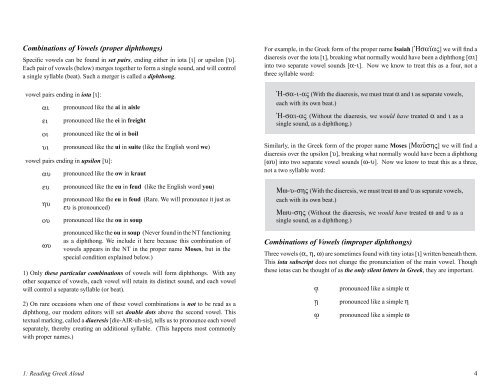Elementary New Testament Greek, 2014a
Elementary New Testament Greek, 2014a
Elementary New Testament Greek, 2014a
Create successful ePaper yourself
Turn your PDF publications into a flip-book with our unique Google optimized e-Paper software.
Combinations of Vowels (proper diphthongs)<br />
Specic vowels can be found in set pairs, ending either in iota [] or upsilon [].<br />
Each pair of vowels (below) merges together to form a single sound, and will control<br />
a single syllable (beat). Such a merger is called a diphthong.<br />
vowel pairs ending in iota []:<br />
<br />
<br />
<br />
<br />
pronounced like the ai in aisle<br />
pronounced like the ei in freight<br />
pronounced like the oi in boil<br />
pronounced like the ui in suite (like the English word we)<br />
vowel pairs ending in upsilon []:<br />
<br />
<br />
<br />
<br />
<br />
pronounced like the ow in kraut<br />
pronounced like the eu in feud (like the English word you)<br />
pronounced like the eu in feud (Rare. We will pronounce it just as<br />
is pronounced)<br />
pronounced like the ou in soup<br />
pronounced like the ou in soup (Never found in the NT functioning<br />
as a diphthong. We include it here because this combination of<br />
vowels appears in the NT in the proper name Moses, but in the<br />
special condition explained below.)<br />
1) Only these particular combinations of vowels will form diphthongs. With any<br />
other sequence of vowels, each vowel will retain its distinct sound, and each vowel<br />
will control a separate syllable (or beat).<br />
2) On rare occasions when one of these vowel combinations is not to be read as a<br />
diphthong, our modern editors will set double dots above the second vowel. This<br />
textual marking, called a diaeresis [die-AIR-uh-sis], tells us to pronounce each vowel<br />
separately, thereby creating an additional syllable. (This happens most commonly<br />
with proper names.)<br />
For example, in the <strong>Greek</strong> form of the proper name Isaiah [] we will nd a<br />
diaeresis over the iota [], breaking what normally would have been a diphthong []<br />
into two separate vowel sounds []. Now we know to treat this as a four, not a<br />
three syllable word:<br />
(With the diaeresis, we must treat and as separate vowels,<br />
each with its own beat.)<br />
(Without the diaeresis, we would have treated and as a<br />
single sound, as a diphthong.)<br />
Similarly, in the <strong>Greek</strong> form of the proper name Moses [] we will nd a<br />
diaeresis over the upsilon [], breaking what normally would have been a diphthong<br />
[] into two separate vowel sounds []. Now we know to treat this as a three,<br />
not a two syllable word:<br />
(With the diaeresis, we must treat and as separate vowels,<br />
each with its own beat.)<br />
(Without the diaeresis, we would have treated and as a<br />
single sound, as a diphthong.)<br />
Combinations of Vowels (improper diphthongs)<br />
Three vowels ( ) are sometimes found with tiny iotas [] written beneath them.<br />
This iota subscript does not change the pronunciation of the main vowel. Though<br />
these iotas can be thought of as the only silent letters in <strong>Greek</strong>, they are important.<br />
<br />
<br />
<br />
pronounced like a simple <br />
pronounced like a simple <br />
pronounced like a simple <br />
1: Reading <strong>Greek</strong> Aloud<br />
4


















